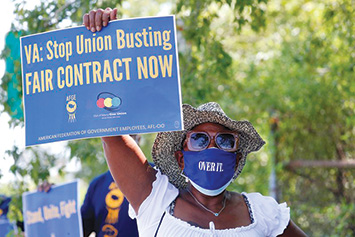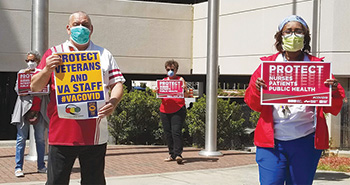Bill would grant collective bargaining rights to all VA healthcare workers

Washington – The American Federation of Government Employees’ National VA Council (AFGE NVAC) and National Nurses United (NNU) are praising the reintroduction of the VA Employee Fairness Act, which would grant collective bargaining rights for nurses, clinicians and other healthcare professionals at Veterans Administration (VA) medical facilities.
AFGE NVAC represents over 265,000 Veterans Affairs (VA) employees. NNU represents 12,000 registered nurses at 23 VA facilities across the country. Many in both groups are veterans themselves.
The bill, introduced March 16 by Rep. Mark Takano (D-Calif) and Senator Sherrod Brown (D-Ohio), would reform Section 7422 of U.S. Code Title 38, ensuring the rights of nurses and other healthcare professionals to file grievances and pursue arbitration over issues related to patient care, economic standards and health coverage.
SIMPLY WRONG
“It is simply wrong that the nurses who care for our veterans are being denied the same basic workers’ rights that other unionized workers enjoy,” said Zenei Triunfo-Cortez, RN and an NNU president. “We must ensure that the collective voice of our VA nurses is protected so they can address the issues that arise as we care for our country’s heroes.”

While VA employees have had collective bargaining rights since 1991, health care providers are exempted from collective bargaining on matters of professional conduct or competence, peer-review, or changes to employee compensation, preventing them from raising grievances about staffing shortages that undermine patient care or negotiating for competitive pay that will attract health care workers to the VA.
Two years ago, the Trump administration went further and stripped medical professionals of almost all of their union rights as part of its larger union-busting agenda.
“The restrictions placed upon doctors’ and nurses’ union rights have always been unwarranted,” AFGE President Everett Kelley said. “It is critical that Congress pass the VA Employee Fairness Act to ensure that all VA workers who have elected union representation have a voice in the workplace, regardless of their job title.”
PROTECTION FOR SPEAKING UP
“Registered nurses have a duty to advocate for their patients at the bedside, and they must be protected when they speak up about issues that affect patient care,” said Irma Westmoreland, RN, chair of Veterans Affairs for NNU.
“Without full collective-bargaining rights, nurses can be vulnerable to retaliation when they bring up workplace issues such as unsafe staffing, insufficient supplies, or inappropriate nurse assignments. The VA Employee Fairness Act would strengthen our nurses’ ability to speak out about patient safety issues and therefore, help ensure that the VA continues to provide the highest quality of care to our veterans.”
EMPLOYEES, FACILITIES HIT HARD BY PANDEMIC
VA employees and facilities across the country have been hit hard by the COVID-19 pandemic, coinciding with their decades-long fight for fair collective bargaining agreement. Under the previous administration, the VA developed a track record of ignoring worker concerns and putting veterans’ lives at risk.
COVID-19 pandemic has claimed the lives of 135 VA employees and over 10,500 veterans. The VA has recorded more than 228,000 COVID-19 cases in all 50 states, the District of Columbia and Puerto Rico, and nearly 18,000 VA employees have contracted the virus.
“Thanks to VA’s talented health care professionals, VA offers some of the best health care in the world,” said Rep. Takano, chairman of the House Committee on Veterans’ Affairs.
“During the height of the Covid-19 pandemic, VA’s doctors, nurses, and medical professionals even stepped up to serve all Americans. However, many of these providers still don’t have key workplace rights that are standard across the federal government.
“If we’re going to fill VA’s 39,000 vacancies,” Takano said, “we need to ensure VA can continue to recruit and retain top-tier medical professionals and provide exemplary care for our nation’s veterans. By granting these essential health care workers full collective bargaining rights, our bill will help make that possible.”
DUTY TO EMPOWER, PROTECT WORKERS
“The nurses, physicians, dentists, physician assistants, and other health care workers at our nation’s VA medical centers, many of whom are veterans themselves, are the best at what they do,” said Sen. Brown, a member of the Senate Committee on Veterans’ Affairs.
“Expanding the right to collectively bargain is one of the most important tools we can use to empower these workers and ensure they have a voice in the workplace. It means these essential workers can advocate for patient safety and improved health care coverage, they can earn higher wages and they can have more paid time off, which will improve our veterans’ care and strengthen local economies, families, and communities.”
AFGE NVAC President Alma Lee said “If leaders in Congress truly want to protect front-line healthcare workers and our nation’s Veterans as they say they do, then they will vote to pass this bill.
“This pandemic has shed a light on the importance of workers having a voice on the job. Politicians across the aisle have a duty to protect our federal workforce, strengthen their collective bargaining rights, and partner with federal sector unions. I look forward to working with members of the House and Senate to get this done.”


